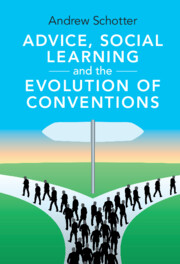Book contents
- Frontmatter
- Dedication
- Brief Contents
- Contents
- Figures
- Tables
- Preface
- 1 Introduction
- Part I Background
- Part II Coordination, Distribution, and Trust Conventions
- 4 On the Evolution of Coordination and Inequality-Preserving Conventions – the Battle of the Sexes Revisited
- 5 Conventional Behavior and Bargaining – Advice and Behavior in Intergenerational Ultimatum Games
- 6 Trust and Trustworthiness
- Part III The Impact of Public Advice and Common Knowledge
- Part IV The Value of Advice
- Part V Advice and Economic Mechanisms
- Index
5 - Conventional Behavior and Bargaining – Advice and Behavior in Intergenerational Ultimatum Games
from Part II - Coordination, Distribution, and Trust Conventions
Published online by Cambridge University Press: 09 March 2023
- Frontmatter
- Dedication
- Brief Contents
- Contents
- Figures
- Tables
- Preface
- 1 Introduction
- Part I Background
- Part II Coordination, Distribution, and Trust Conventions
- 4 On the Evolution of Coordination and Inequality-Preserving Conventions – the Battle of the Sexes Revisited
- 5 Conventional Behavior and Bargaining – Advice and Behavior in Intergenerational Ultimatum Games
- 6 Trust and Trustworthiness
- Part III The Impact of Public Advice and Common Knowledge
- Part IV The Value of Advice
- Part V Advice and Economic Mechanisms
- Index
Summary
In the real world, when people play games, they often receive advice from those that have played it before them. Such advice can facilitate the creation of a convention of behavior. This chapter studies the impact of advice on the behavior of subjects who engage in a non-overlapping generational ultimatum game where, after a subject plays, she is replaced by another subject to whom she can offer advice. Our results document the fact that allowing advice fosters the creation of a convention of behavior in ultimatum games. In addition, by reading the advice offered, we conclude that arguments of fairness are rarely used to justify the offers of senders but are relied upon to justify rejections by receivers.
- Type
- Chapter
- Information
- Advice, Social Learning and the Evolution of Conventions , pp. 111 - 137Publisher: Cambridge University PressPrint publication year: 2023

